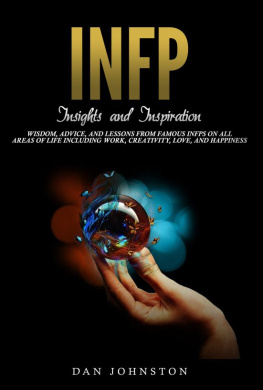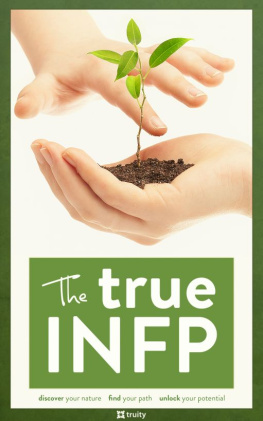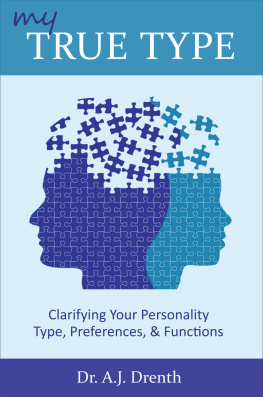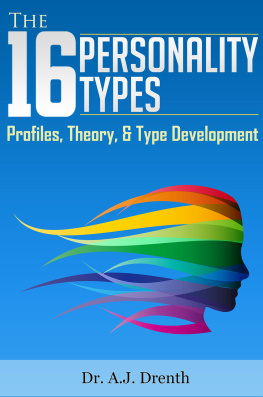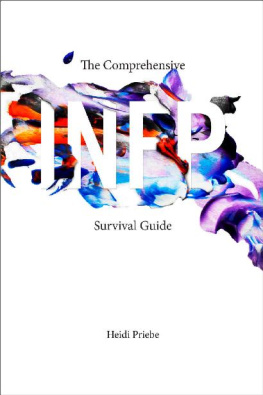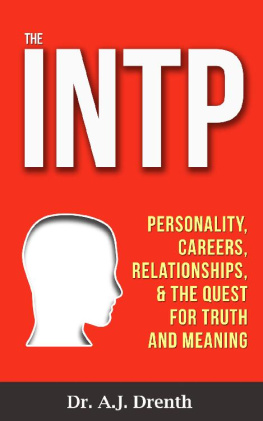The INFP Book
The perks, challenges, and self-discovery of an INFP
By: Catherine Chea
Copyright 2017 Catherine Chea
Published in 2017 by Amazon Digital Services, Inc.
All rights reserved. No part of this publication may be reproduced, stored in or introduced into a retrieval system, or transmitted in any form or by any means without the prior written consent of the copyright holder.
Book cover artwork is courtesy of Zakaria Nada.
Copyright licensed by Catherine Chea.
ISBN-13: 978-1542815697
ISBN-10: 154281569X
To all the healers and dreamers: Thank you for filling this world with inspiration, imagination, and compassion.
Introduction
I wrote this book because I know how challenging life can be when you feel misunderstood most of the time. As an INFP, I've always felt different from the rest of society. INFPs are described as being reserved, imaginative, passionate, creative, and quirky. These are some of the many qualities that make us unique, but also estranged from the rest of the world which often demands for us to be far more extroverted, conventional, and pragmatic than we naturally are. At times, I even feel as if I am not made for an "ordinary" life.
After discovering my personality type and learning more about what it entails to be an INFP, Ive felt more understood than ever before. Its relieving to know that there are other people out there who share similar feelings and can relate to my experiences. I now have a better understanding of my motivations and feelings. Learning more about myself has helped me better respond to situations, communicate with others, and ultimately feel more comfortable in my own shoes.
This book will give you a deeper insight to the INFP personality type. You'll learn the common challenges that many INFPs face and ways to overcome them, to become a healthier and more well-rounded individual. I'll share with you my research into my personality type, some personal reflections, anecdotes, and the lessons that I've learned. In doing so, I hope to inspire and connect with other INFPs who might feel lost in this world.
The first part of this book will provide a detailed description of this personality type and look into its cognitive functions and how it manifests in our experiences. The second part dives deep into my personal struggles and how it relates to my personality. I will also look at some tools that I've developed to help me cope with different situations. The third part focuses on how I discovered my career (I know many INFPs struggle in this department, so it deserves an entire section), and the last part features inspirational tidbits to further show how INFPs can truly shine.
And finally, although I'm writing this book for INFPs, it's not exclusive to people who identify as this personality type. This book is for anyone who is interested in learning about the perks, challenges, and self-discovery of being an Introverted, Intuitive, Feeling, and Perceiving (INFP) personality type.
INFPs can be an unstoppable force who can move mountainsnot just in their dreams, but in the real world. And this book will show you how this can be done.
Part I
A portrait of the INFP
Even now, when I see my name on paper, I feel that the world is intruding unduly on my privacy. I ought to be anonymous.
A.A. Milne
Chapter 1: Whats an INFP?
I know that I am what I am, but I am not sure what I am. Mason Cooley
If youre reading this book, you might already have an idea of what an INFP isbeing one of the sixteen personality types in the Myers-Briggs Type Indicator (MBTI). This personality assessment was constructed by Katherine Briggs and her daughter Isabel Myers Briggs and is based on the typological theory proposed by Carl Jung.
The purpose of the MBTI is not to put you in a box, but to help you with your self-discovery by understanding the lens through which you see the world. Unfortunately, due to the popularity of this test, there is a vast internet-based culture surrounding it that has created many misleading generalizations. There are blogs, free tests, YouTube videos, celebrity types, and memes about MBTI all over the internet!
Many of these resources describe the personality types based on their common characteristics and observed behaviors, without referring to the cognitive functions in Jungs typology. This leads to stereotypes and even encourages a biased self-assessment (since it may sound more appealing to be a Thinker than a Feeler).
However, the truth is, each personality type is multifaceted and embodies all of the cognitive functions in Jungs typology in varying degrees. Your four letter code, which designates you as one of the sixteen personality types, does not restrict you to only four cognitive preferences. For instance, although an INFP stands for Introversion, Intuition, Feeling, and Perceiving , this does not mean that INFPs always prefer introversion over extroversion, or that we don't make decisions based on logic. But before I get too ahead of myself, I will first explain the main dichotomies in the MBTI, and then I'll proceed to clarify the functions.
The dichotomies
The cognitive preferences can be understood in pairs of opposites:
Introversion vs. Extroversion
Sensing vs. Intuition
Thinking vs. Feeling
Judging vs. Perceiving
Combining the four individual preferences yields sixteen distinct types of personality, which are represented by each of its letters.
The first letter
"E" stands for Extroversion and "I" stands for Introversion. This designates where you prefer to get your energy from: the outer world or the inner world. People who prefer Extroversion are energized by interacting with their external environment; they feel the need to surround themselves with people, things, or activities that will help them recharge. People who prefer Introversion orient their energies to their inner world and recharge by giving themselves alone-time to think and reflect.
The second letter
"S" stands for Sensing and "N" stands for Intuition. These are perceiving functions, which identify how a person typically gathers information. People who prefer Sensing prefer to acquire concrete information from their immediate environment. They are considered pragmatic and like to look at facts first and then form an idea. In contrast, people who prefer Intuition are more conceptual and prefer to gather information by focusing on patterns, meanings, and future possibilities. Instead of learning through hands-on experience, they prefer to learn by thinking through a problem and like to see the big picture instead of facts. They often like to look at possibilities without ever implementing them.
The third letter
"T" stands for Thinking and "F" stands for Feeling. These are judging functions, which identify how a person makes decisions in the world. People who prefer Thinking tend to make decisions or reach conclusions by focusing on non-personal logical analysis. People who prefer to make their decisions through Feeling tend to concentrate on people-centered values. Although Feelers are motivated by a subjective outcome, such as considering how their choices would affect another persons well-being, this does not mean that they are irrational; rather, they focus on subjective values more than Thinkers.
The fourth letter
"J" stands for Judging and "P" stands for Perceiving. This letter identifies whether the person takes a Judging or Perceiving attitude towards the outer world. People who prefer a Judging attitude like to make decisions and reach closure; they function best when there is structure and order in their daily lives. People who prefer a Perceiving attitude enjoy gathering as much information about the outer world as possible; they tend to function best when they can take a flexible, adaptable, and spontaneous approach to the world.




